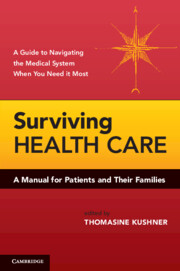Book contents
- Frontmatter
- Contents
- Contributors
- Preface
- 1 Letter to Patients
- 2 Becoming an Active Member of Your Health Care Team
- 3 Information That Will Help You with Advance Planning for Your Health Care
- 4 Responding to Medical Emergencies
- 5 What You Need to Know about Medical Errors
- 6 Being Informed When You Give Consent to Medical Care
- 7 Beware of Scorecards
- 8 Transplantation 101
- 9 When the Illness Is Psychiatric
- 10 On the Horizon
- 11 To Be or Not to Be – A Research Subject
- 12 Information That Will Help You Make Health Care Decisions for Adult Family Members
- 13 Caring for Individuals with Alzheimer's Disease
- 14 When the Patient Is a Child
- 15 Care of Elders
- 16 Being and Thinking
- 17 A Patient's Guide to Pain Management
- 18 The Hardest Decisions
- 19 What You Need to Know about Disasters
- 20 Making the Internet Work for You
- Appendix: Patient Individual Profile
- Index
Appendix: Patient Individual Profile
Published online by Cambridge University Press: 05 June 2012
- Frontmatter
- Contents
- Contributors
- Preface
- 1 Letter to Patients
- 2 Becoming an Active Member of Your Health Care Team
- 3 Information That Will Help You with Advance Planning for Your Health Care
- 4 Responding to Medical Emergencies
- 5 What You Need to Know about Medical Errors
- 6 Being Informed When You Give Consent to Medical Care
- 7 Beware of Scorecards
- 8 Transplantation 101
- 9 When the Illness Is Psychiatric
- 10 On the Horizon
- 11 To Be or Not to Be – A Research Subject
- 12 Information That Will Help You Make Health Care Decisions for Adult Family Members
- 13 Caring for Individuals with Alzheimer's Disease
- 14 When the Patient Is a Child
- 15 Care of Elders
- 16 Being and Thinking
- 17 A Patient's Guide to Pain Management
- 18 The Hardest Decisions
- 19 What You Need to Know about Disasters
- 20 Making the Internet Work for You
- Appendix: Patient Individual Profile
- Index
Summary
Dear Patient:
This book began with a letter to you, and it is fitting that it ends with one as well. It is evident throughout the chapters that there are two realities of contemporary health care: 1) Your health providers want to take care of you and your health needs in the best way possible, and 2) there is less and less time available for them to spend with each patient. To address these conflicting realities, we offer the Patient Individual Profile form as a way for your health care providers – principally, your doctors and nurses – to learn more about you – your background, values, and preferences. Having this information will help them go beyond treating just your body – it will let them look at you as a person.
This form is a way to talk about things that matter to you most. The questions are intended to give you an opportunity to share the sort of information with your health providers that does not commonly arise in the course of treatment but does have a bearing on who you are. The questions are intended to provide a personal portrait that goes beyond you as a patient, but you should use them as you wish. Feel free to leave any questions unanswered or substitute others you believe are important, and take advantage of the note at the end to tell your providers anything else you want them to know.
- Type
- Chapter
- Information
- Surviving Health CareA Manual for Patients and Their Families, pp. 311 - 316Publisher: Cambridge University PressPrint publication year: 2010

